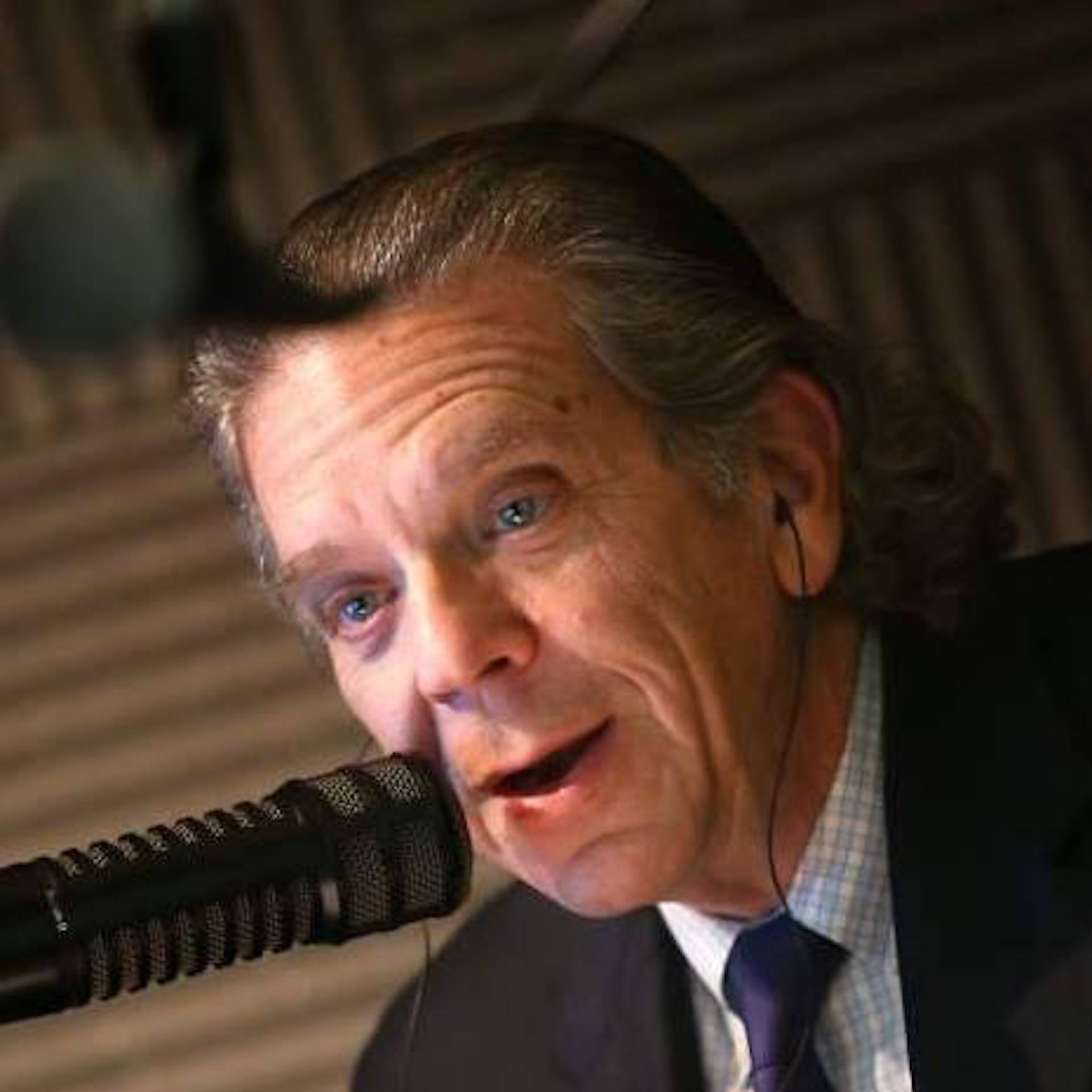Episodes
Monday Oct 14, 2019
The End of America's Cultural Hegemony
Monday Oct 14, 2019
Monday Oct 14, 2019
 A look at the news any day reminds us that America is no longer the singular dominant power in the world. This is true vis a vis soft power, moral persuasion, and now cultural power.
A look at the news any day reminds us that America is no longer the singular dominant power in the world. This is true vis a vis soft power, moral persuasion, and now cultural power.
American movies, music, and art no longer are the single option for global entertainment. Perhaps not since the British invasion of the ‘60s have we seen so much art and entertainment coming from outside of the U.S. This time form India, South Korea, and even Turkey. This is the world that Fatima Bhutto takes us into in New Kings of the World: Dispatches from Bollywood, Dizi, and K-Pop
My conversation with Fatima Bhutto:
Saturday Oct 12, 2019
The Tyranny of Virtue: Political Correctness Run Amuck on Our Campuses
Saturday Oct 12, 2019
Saturday Oct 12, 2019
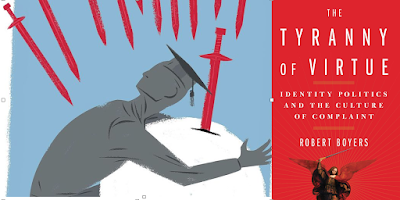 Once upon a time, we didn’t have to think about political correctness. And we survived as a culture! We self-corrected, we became more sensitive to others, we learned to accept and appreciate diversity. It was sometimes difficult, even painful. But a lot of it was organic. Often we slipped up. We fell backward, and sometimes it even took appropriate legislation to provide better guardrails for our behavior. Such was the forward march of mankind.
Once upon a time, we didn’t have to think about political correctness. And we survived as a culture! We self-corrected, we became more sensitive to others, we learned to accept and appreciate diversity. It was sometimes difficult, even painful. But a lot of it was organic. Often we slipped up. We fell backward, and sometimes it even took appropriate legislation to provide better guardrails for our behavior. Such was the forward march of mankind.
But today, the bludgeon of political correctness hangs over all of us. And nowhere worse than on our college campuses. The fear of free speech, the absurdity of safe spaces, the desire to silence unpopular ideas and the seeking out of problems and conflicts that don’t really exist, are all hallmarks of where we are today.
But how did we get here, and is there any path out that does not divides us still further, polarize us even more and further enhance the sanctimony of those who consider their ideas singularly virtuous.
Skidmore professor Robert Boyers, the subject of a story in this week’s New Yorker takes us into the belly of the beast of political correctness in his new book The Tyranny of Virtue: Identity, the Academy, and the Hunt for Political Heresies.
My conversation with Robert Boyers:
Tuesday Oct 08, 2019
Just Who is Brett Kavanaugh?
Tuesday Oct 08, 2019
Tuesday Oct 08, 2019
 Most of us remember being transfixed, just one year ago, to the hearings from now Supreme Court Justice Brent Kavanaugh. This week, as the court begins its new term, Justice Kavanaugh will be part of a court deciding on some of the most fundamental cases that affect our politics, our culture, and our freedoms. All in an atmosphere that, if even possible, is even more polarized than it was a year ago.
Most of us remember being transfixed, just one year ago, to the hearings from now Supreme Court Justice Brent Kavanaugh. This week, as the court begins its new term, Justice Kavanaugh will be part of a court deciding on some of the most fundamental cases that affect our politics, our culture, and our freedoms. All in an atmosphere that, if even possible, is even more polarized than it was a year ago.
So who is Brett Kavanaugh? Certainly the one week FBI investigation and the televised circus that was his hearing may not have told the whole story. For that, we must rely on the reporting of Robin Pogrebin and Kate Kelly in their new book The Education of Brett Kavanaugh: An Investigation.
My conversation with Robin Pogrebin:
Wednesday Oct 02, 2019
Why Understanding Silicon Valley History is Necessary To Deal With Today's Tech Issues
Wednesday Oct 02, 2019
Wednesday Oct 02, 2019
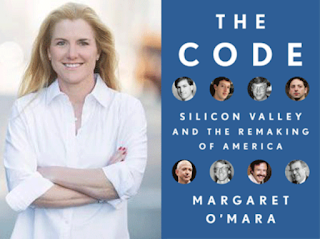 So much of what passes for history today is one dimensional. We see the events, the names, the places the timeline and the heroes and the villains. But there is often another dimension. Not so much a secret history, but almost like the moon, it has a dark side, hidden from us. It’s there, we just don’t see it and therefore we don't’ appreciate it and its broader impact.
So much of what passes for history today is one dimensional. We see the events, the names, the places the timeline and the heroes and the villains. But there is often another dimension. Not so much a secret history, but almost like the moon, it has a dark side, hidden from us. It’s there, we just don’t see it and therefore we don't’ appreciate it and its broader impact.
So it is with Silicon Valley. Literally, millions of words have been written about it. In fact, with the exception of politics and Washington, no place gets more coverage and attention. No accident given their long symbiotic relationship.
Therefore you would think that by now we know it all. But we don't. This is why people still write books and surprise us about our origin story as a nation and about our wars past. And it’s why, particularly at this time when tech is under such scrutiny, we should understand everything we can about its history. That’s what Margaret O’Mara has tried to do in The Code: Silicon Valley and the Remaking of America
My conversation with Margaret O'Mara:
Monday Sep 30, 2019
Trump's War on the FBI
Monday Sep 30, 2019
Monday Sep 30, 2019
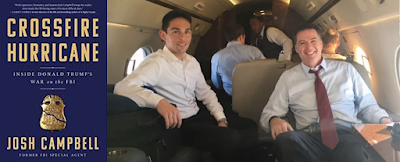 Today Trump's war is against Congress and the intelligence community. Previously he went to war with the FBI with the same mob boss approach that resulted in the firing of Jim Comey and Andrew McCabe and the repeated attacks on the integrity of the FBI
Today Trump's war is against Congress and the intelligence community. Previously he went to war with the FBI with the same mob boss approach that resulted in the firing of Jim Comey and Andrew McCabe and the repeated attacks on the integrity of the FBI
What can that recent history tell us about where we are now? About the strength and/or fragility of our fundamental law enforcement and intelligence institutions and the long term consequences to individuals and to the country?
To put it all in some kind of up-close perspective is CNN law enforcement analyst Josh Campbell, in Crossfire Hurricane: Inside Donald Trump's War on the FBI.
My conversation with Josh Campbell:
Thursday Sep 26, 2019
We are All Cult Members Now!
Thursday Sep 26, 2019
Thursday Sep 26, 2019
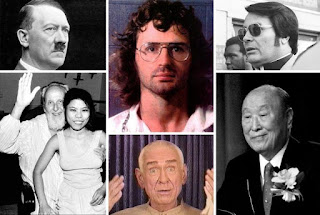 As a nation we’ve certainly gone through difficult times, times that as Thomas Paine said, try men’s souls. We’ve been divided as during the Cold War and the Civil War. But rarely have we been as tribal as we are today. Rarely have we been as willing to throw off facts, science, and reality, in the service of a cause. It’s almost like we’ve all joined cults. Little by little we’ve been encouraged to issue our faith in institutions and believe in nothing, which makes us more vulnerable to be made to believe anything.
As a nation we’ve certainly gone through difficult times, times that as Thomas Paine said, try men’s souls. We’ve been divided as during the Cold War and the Civil War. But rarely have we been as tribal as we are today. Rarely have we been as willing to throw off facts, science, and reality, in the service of a cause. It’s almost like we’ve all joined cults. Little by little we’ve been encouraged to issue our faith in institutions and believe in nothing, which makes us more vulnerable to be made to believe anything.
As we throw off critical thinking, as we look for order out of the chaos of creative destruction, as we deal with the consequences of a rapidly changing and technological world, we exhibit so many of the signs of those that fall into cults. That’s our focus with Dr. Janja Lalich. She’s a researcher, author and educator specializing in cults and extremist groups with a particular focus on charismatic relationships and political and other social movements.
My WhoWhatWhy conversation with Dr. Janja Lalich:
Wednesday Sep 25, 2019
Is Clothing the New Plastic?
Wednesday Sep 25, 2019
Wednesday Sep 25, 2019
 No matter who we are, we are touched by food, shelter, and clothing. Of the three perhaps clothing is one we most take for granted. Unlike our food, we don’t usually think about where it comes from, unlike shelter, it’s in abundance and unlike these other necessities, the price keeps falling while style keeps improving.
No matter who we are, we are touched by food, shelter, and clothing. Of the three perhaps clothing is one we most take for granted. Unlike our food, we don’t usually think about where it comes from, unlike shelter, it’s in abundance and unlike these other necessities, the price keeps falling while style keeps improving.
It’s almost too good to be true. And maybe it is. Maybe there is a darker side, a steeper price for this proliferation of fashion. Dana Thomas explains this in Fashionopolis: The Price of Fast Fashion and the Future of Clothes.
My conversation of Dana Thomas:
Sunday Sep 22, 2019
The CIA in the Post 9/11 World
Sunday Sep 22, 2019
Sunday Sep 22, 2019
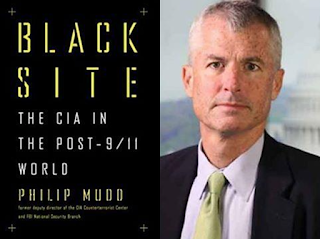 Our attention span grows shorter while the events creating a whirlwind around the world, increase. N. Korea, Iran, China, Russia, Saudi Arabia, plus domestic turmoil is everywhere. In all of this, it’s easy to forget, just 18 short years after 9/11.
Our attention span grows shorter while the events creating a whirlwind around the world, increase. N. Korea, Iran, China, Russia, Saudi Arabia, plus domestic turmoil is everywhere. In all of this, it’s easy to forget, just 18 short years after 9/11.
I often wonder how we’ll see this period that we are living through from the perspective of 50 years. But with respect to 9/11, the rearview mirror is starting to come into focus, as the objects are closer than they appear.
How the world and the US intelligence has transformed as a result of those events impacts everything we do today and is worth examining with this renewed hindsight.
In that sense, my guest Philip Mudd was present at the creation. He was in the White House as events of 9/11 unfolded and now he’s writing about them in ways that may inform or future. His recent book is Black Site: The CIA in the Post-9/11 World.
My conversation with Philip Mudd:
Tuesday Sep 17, 2019
A 1998 conversation with Cokie Roberts
Tuesday Sep 17, 2019
Tuesday Sep 17, 2019
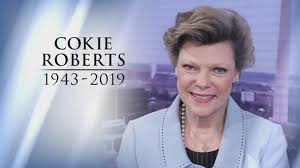 Over the many years of doing this program, I'm sorry to say I only had one opportunity to talk with Cokie Roberts. We talked back in 1998 upon the publication of her book about mothers and daughters, and the changing role of women. It was a long time before Me Too, but she was prescient about so many of the issues that would evolve over the next 20 years.
Over the many years of doing this program, I'm sorry to say I only had one opportunity to talk with Cokie Roberts. We talked back in 1998 upon the publication of her book about mothers and daughters, and the changing role of women. It was a long time before Me Too, but she was prescient about so many of the issues that would evolve over the next 20 years.
I share that 1998 conversation.
Tuesday Sep 17, 2019
She Said
Tuesday Sep 17, 2019
Tuesday Sep 17, 2019
 In All the President's Men, as reported by Woodward and Bernstein, Deep Throat says to Woodward, in the bowls of a garage, “it leads everywhere, get your notebook, there’s more.”
In All the President's Men, as reported by Woodward and Bernstein, Deep Throat says to Woodward, in the bowls of a garage, “it leads everywhere, get your notebook, there’s more.”
And so there was. Just as there was with the story of Harvey Weinstein. But on a larger canvas, it was the story of men behaving badly for a long time and getting away with it.
Fortunately, journalism is more than the first draft of history. Sometimes, facts, especially if they are an agreed-upon set of facts that are exposed, can change the course of history. Woodward and Bernstein are certainly an example. But so is Sy Hersh for reporting on Mai Li, Neil Sheehan on the Pentagon Papers, and Bart Gellman and the Edward Snowden revelations Now.add to this pantheon Jodi Kantor and Megan Twohey for their reporting on sexual harassment in the workplace, and ultimately on Harvey Weinstein and the explosion of the “Me-Too” movement.
Jodi Kantor and Megan Twohey are investigative reporters at the New York Times and the authors of She Said: Breaking the Sexual Harassment Story That Helped Ignite a Movement.
My conversation with Megan Twohey:
Sunday Sep 15, 2019
Charles and David Koch Are Not Who You Think They Are!
Sunday Sep 15, 2019
Sunday Sep 15, 2019
 Silent Cal Coolidge is reported to have said “that the business of America is business.” Correct or not, it’s fair to say that by looking at only American business over the past 60 years, we can see the full arc of our contemporary history.
Silent Cal Coolidge is reported to have said “that the business of America is business.” Correct or not, it’s fair to say that by looking at only American business over the past 60 years, we can see the full arc of our contemporary history.
Think of all of the things that have been front and center in our politics and our culture that have sprung from business, going all the way back to the 60’s. Conglomerates, the free movement of money around the world, manufacturing changes, management and blue-collar workers, government control and union membership. Private equity, derivatives, lobbyists, corporate political contributions, climate change, think tanks and branding.
Each and every one of these things have been a part of the empire that is Koch Industries and has been touched and shaped by Charles and David Koch.
Whether you like their particular brand of politics or not, the company and the empire they built have to be respected. Whether Balzac was correct when he said that “behind every great fortune is a great crime,” is a question worth examining in the context the Koch industry.
That’s part of the deep dive into Koch that business journalist Christopher Leonard has given us in his new book Kochland: The Secret History of Koch Industries and Corporate Power in America.
My conversation with Christopher Leonard:
Sunday Sep 08, 2019
The Other Scandal: The College Dropout Scandal
Sunday Sep 08, 2019
Sunday Sep 08, 2019
 In most places around the country, school is beginning. This includes the nation's colleges and universities where about 2 million high school graduates will soon start college.
In most places around the country, school is beginning. This includes the nation's colleges and universities where about 2 million high school graduates will soon start college.
Yet 40% of those incoming freshmen will drop out before graduating. Many with debt, limited job prospects, and shattered confidence.
Why is this number so high? Why are some colleges succeeding in keeping kids engaged and others failing so miserably? Are there best practices? Is this simply another reflection of the economic divide in America? Is it happening at elite universities? Can we test for it, and what are the consequences if the problem goes ignored?
All of these questions are part of the new book The College Dropout Scandal by my David Kirp
My conversation with David Kirp:
Tuesday Sep 03, 2019
How Women are Changing American Politics
Tuesday Sep 03, 2019
Tuesday Sep 03, 2019
 Our founders devised a political system that was inherently difficult to change. They saw almost every aspect of the desire for change as needing to be cooled before even the most white-hot desire for progress could be codified. With respect to race and gender, it’s been even more difficult. Those were the prejudices and stereotypes baked into the founding documents themselves.
Our founders devised a political system that was inherently difficult to change. They saw almost every aspect of the desire for change as needing to be cooled before even the most white-hot desire for progress could be codified. With respect to race and gender, it’s been even more difficult. Those were the prejudices and stereotypes baked into the founding documents themselves.
This is certainly one of the reasons it has taken so long for people of color and for women to be a full part of the political process.
Hillary Clinton talked about those tens of millions of cracks in the glass ceiling. But the safety glass that is history, made those cracks very hard to break. In fact, perhaps it was only with the elections of 2018 that we have seen some of those cracks become full-blown breaks. Even though women have made political progress, the terms of the debate and the campaigns have been based on the historical precedents set by white men.
All of this is changing as is documented by Caitlin Moscatello in her new book See Jane Win: The Inspiring Story of the Women Changing American Politics.
My conversation with Caitlin Moscatello:
Friday Aug 23, 2019
Trump Even Screws Up Conspiracy Theories
Friday Aug 23, 2019
Friday Aug 23, 2019
Long before the Internet, in the early days of talk radio, the all-night hosts were the progenitors of modern-day conspiracy theory. Hosts spent hours talking about crop circles, animal mutilation, Area 51, the Kennedy assassination and all manner of events and evidence that could be used to construct a hidden narrative.
The idea was that strange things were happening, that evidence in plain sight could be interpreted in ways that evolved to different conclusions. The narrative was always about the interpretation of evidence that was in plain sight. We were told that we just didn’t understand the full impact of what it meant.
Today, all of that has changed. Almost like science, the “conspiracy theories” today from people like Alex Jones, or Donald Trump are not about another way of interpreting the world. It’s all about flat out lies, fabricated rumors and it’s often presented with the only backup being the mantra, “people are saying.”
Laying bear this new look to conspiracies are Harvard Professor Nancy Rosenblum and Dartmouth Professor Russell Muirhead in their book A Lot of People Are Saying: The New Conspiracism and the Assault on Democracy
My WhoWhatWhy conversation with Nancy Rosenblum and Russell Muirhead:
Tuesday Aug 13, 2019
To Live and Work In Hollywood
Tuesday Aug 13, 2019
Tuesday Aug 13, 2019
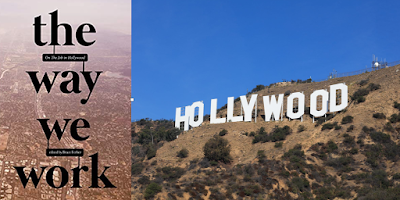 Hollywood is a place where the assets go home each night. Not just the Stars, but the hard-working men and women who make magic happen. Who each play a singular and unique role in telling cinematic stories. Each is a piece of a large puzzle and without each individual piece, the picture never comes together.
Hollywood is a place where the assets go home each night. Not just the Stars, but the hard-working men and women who make magic happen. Who each play a singular and unique role in telling cinematic stories. Each is a piece of a large puzzle and without each individual piece, the picture never comes together.
Sure Hollywood is a business and billions are dollars are always at stake. But without the experience, the craft and the talents of those behind the camera, none of it happens.
These are the “gig workers” that writer-producer Bruce Ferber gets to open up in The Way We Work: On The Job in Hollywood.
My conversation with Bruce Ferber
Wednesday Aug 07, 2019
The GOP's Strategy To Embrace Racism
Wednesday Aug 07, 2019
Wednesday Aug 07, 2019
 Once upon a time the South was a solid Democratic block of votes. Many of those segregationist senators that Joe Biden recently talked about were in fact Democrats. Republicans just didn't get elected from there. And then things changed. The civil rights movement, the voting rights Act, the trailing impact of demographic change from the great migration, and broader cultural changes, including the rise of feminism, all provided an opportunity for Republicans in the South to exploit racial, social and cultural divides.
Once upon a time the South was a solid Democratic block of votes. Many of those segregationist senators that Joe Biden recently talked about were in fact Democrats. Republicans just didn't get elected from there. And then things changed. The civil rights movement, the voting rights Act, the trailing impact of demographic change from the great migration, and broader cultural changes, including the rise of feminism, all provided an opportunity for Republicans in the South to exploit racial, social and cultural divides.
Today we are living with arguably the apogee that effort.
These divisions have been part of every national election since LBJ vs. Goldwater in 1964 and with each cycle, the divide grows larger. This long effort is the subject of a new work by Angie Maxwell and Todd Shields, The Long Southern Strategy: How Chasing White Voters in the South Changed American Politics.
My conversation with Angie Maxwell and Todd Shields
Monday Jul 29, 2019
The Most Heinous Serial Killer You've Never Heard Of
Monday Jul 29, 2019
Monday Jul 29, 2019
 I know someone who is absolutely fascinated by true crime stories. She says that Silence of the Lambs is her Star Wars. And why not? Crime stories, especially true crime stories about the likes of Ted Bundy, John Wayne Gacy, or Jeffrey Dalmer, fascinate us, as it takes our thinking to the edges of human behavior. Understanding what makes these people tick stretches the human imagination.
I know someone who is absolutely fascinated by true crime stories. She says that Silence of the Lambs is her Star Wars. And why not? Crime stories, especially true crime stories about the likes of Ted Bundy, John Wayne Gacy, or Jeffrey Dalmer, fascinate us, as it takes our thinking to the edges of human behavior. Understanding what makes these people tick stretches the human imagination.
That is exactly what investigative journalist Maureen Callahan does for us in her new book American Predator: The Hunt for the Most Meticulous Serial Killer of the 21st Century In it, she introduces us to a little know serial killer who may very well be one of the most chilling.
My conversation with Maureen Callahan:
Wednesday Jul 24, 2019
A 2019 Way To Look At and Talk To Kids About Race
Wednesday Jul 24, 2019
Wednesday Jul 24, 2019
 It’s clear that like it or not, race will once again be the issue of our time. You’d think by now, we would at least the the language right. But maybe that’s the very problem. We’re still talking about it precisely because we’re having the wrong discussion.
It’s clear that like it or not, race will once again be the issue of our time. You’d think by now, we would at least the the language right. But maybe that’s the very problem. We’re still talking about it precisely because we’re having the wrong discussion.
Almost as long as anyone can remember, we’ve sincerely directed our efforts to eradicate racism by talking about a color-blind society. The goal has been to make race and difference disappear essentially to homogenize the culture. When that hasn’t worked, we perceive that we have failed.
The response to that has been a kind of bifurcated multiculturalism and identity politics, that has moved everyone into their own corner. None of that has helped our understanding
An important new work, by Professor Jennifer Harvey, Raising White Kids: Bringing Up Children in a Racially Unjust America, gives us a new way to view race, justice, and culture.
My conversation with Jennifer Harvey:
Tuesday Jul 16, 2019
Tuesday Jul 16, 2019
 From the moment that Jackie Kennedy branded the Kennedy presidency as Camelot, in an interview with author and historian Theodore White, royalty was suddenly bestowed upon the survivors.
From the moment that Jackie Kennedy branded the Kennedy presidency as Camelot, in an interview with author and historian Theodore White, royalty was suddenly bestowed upon the survivors.
The recoil effect from that simple phrase on Ted and Bobby and the rest of the family was impactful. But at least they were able to understand and process it. For John F. Kennedy Jr. he would immediately become a prince without any say in the matter
As he came of age emotionally, physically and politically, he was permanently marked by the mythology. It shaped every aspect of his public and private life, right up until his untimely death.
Some men and women choose to live in the public eye. Others like royalty, like William and Harry, for example, are just born there and have to come to grips with it.
JFK Jr. was as close as we have gotten to royalty. He was to become an American Prince. How well it served him and his country is still an open question. One explored by Steve Gillon, a historian and long-time friend in his new book America's Reluctant Prince: The Life of John F. Kennedy Jr.
My conversation with Steven Gillon:
Wednesday Jul 10, 2019
The Welfare Queen and Political Mythology
Wednesday Jul 10, 2019
Wednesday Jul 10, 2019
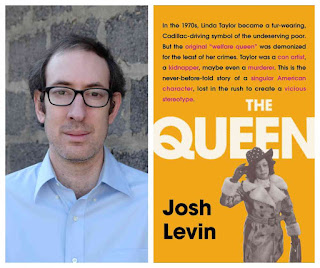 We all remember that Al Capone was ultimately busted on tax fraud, even though he had a long, violent and ugly criminal career. We see it play out in politics where someone is charged with one crime that the government is able to prove, while it is really reflective of a career of many crimes.
We all remember that Al Capone was ultimately busted on tax fraud, even though he had a long, violent and ugly criminal career. We see it play out in politics where someone is charged with one crime that the government is able to prove, while it is really reflective of a career of many crimes.
So it is with the mythology of Linda Taylor. Busted in 1974 for welfare fraud, Taylor had a long history of criminal behavior and is even potentially linked to three suspicious deaths in the 70’s and 80’s
But is was ultimately her conviction on welfare fraud, which made her the infamous “welfare queen,” whose myth would shape our policies from her arrest in 1974, her trope elevated by Ronald Reagan and arguably right up to the political debate today. This is the story that Josh Levin tells in The Queen: The Forgotten Life Behind an American Myth.
My conversation with Josh Levin:
Tuesday Jul 02, 2019
The False Mythology of Roger Ailes
Tuesday Jul 02, 2019
Tuesday Jul 02, 2019
 Many of you may have started watching the Showtime series, THE LOUDEST VOICE IN THE ROOM, about Fox News founder Roger Ailes. The problem with it is, that with respect to what Ailes did, what he is credited with accomplishing at Fox, very little of it is true.
Many of you may have started watching the Showtime series, THE LOUDEST VOICE IN THE ROOM, about Fox News founder Roger Ailes. The problem with it is, that with respect to what Ailes did, what he is credited with accomplishing at Fox, very little of it is true.
Sure Ailes understood television and politics. But at core what he did was to take the world of talk radio, combined it with a bit of “blondification” and transferred it to television. When Fox new went on the air in 1996, Limbaugh had already been on the air for almost ten years.
Ailes simply exploited the rise and power of conservative talk radio. The Economist said many months ago that, “to understand the Republican politics, get in a car, turn on the radio and drive.”
Talk radio, is far more than the viewers that watch even the top rated Fox News shows each night. It's the lens through which millions and millions of its hard core listeners view the world.
No one understands this better than the go-to-guy for talk radio, the founder, editor and publisher of Talkers and Talkers.com, Michael Harrison.
Back in July of 2017, upon the death of Ailes, Harrison and I spoke about this mythology.
My conversation with Michael Harrison:
Friday Jun 28, 2019
The Loudest Voice in the Room
Friday Jun 28, 2019
Friday Jun 28, 2019
Thursday Jun 20, 2019
War Today: We Pay and They Serve
Thursday Jun 20, 2019
Thursday Jun 20, 2019
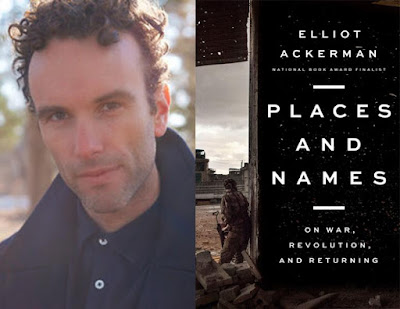 Once upon a time war had structure. There was a kind of narrative arc to war. A beginning, a middle and clear end. In the modern era, certainly since Vietnam, they have become what Clausewitz called “protracted conflict.” Even the efforts to find resolution are nothing more than wars by other means.
Once upon a time war had structure. There was a kind of narrative arc to war. A beginning, a middle and clear end. In the modern era, certainly since Vietnam, they have become what Clausewitz called “protracted conflict.” Even the efforts to find resolution are nothing more than wars by other means.
Most have heard the biblical quote, that “you will hear of wars and rumors of wars, but be not alarmed. These things must happen, but the end is still to come.”
With respect to America's efforts in Iraq and Afghanistan the end has still not come. Few understand this better than the men and women who served. And few articulate it better than Elliot Ackerman in his new work Places and Names: On War, Revolution, and Returning.
My conversation with Elliot Ackerman:
Monday Jun 17, 2019
Cities Represent the Ultimate Achievement of Mankind
Monday Jun 17, 2019
Monday Jun 17, 2019
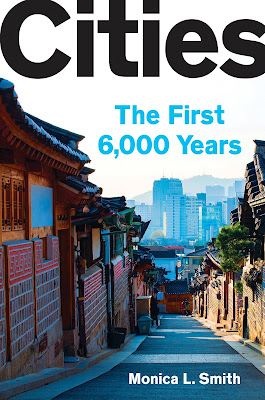 Today, more than one-half of the world's population lives in cities. In every corner of the world, people are moving to cities at a rapid and geometric pace. The urban migration taking place today is both historic and inevitable. Our cities represent the ultimate triumph and organizing principle of humanity. They are more than either the concrete jungle portrayed by Billy Wilder in the Lost Weekend, or the human zoo, that Desmond Morris claimed.
Today, more than one-half of the world's population lives in cities. In every corner of the world, people are moving to cities at a rapid and geometric pace. The urban migration taking place today is both historic and inevitable. Our cities represent the ultimate triumph and organizing principle of humanity. They are more than either the concrete jungle portrayed by Billy Wilder in the Lost Weekend, or the human zoo, that Desmond Morris claimed.
The great San Francisco columnist, Herb Caen, one said of cities, “that they should not be judged just by their length and width, but by the broadness of their vision and the height of their dreams.” They are, in some ways, the ultimate achievements of mankind.
Few understand them better than Monica L. Smith, a professor of anthropology and professor in the Institute of the Environment and Sustainability at the UCLA where she holds a chair in Indian Studies and serves as the director of the South Asian Archeology Laboratory in the Cotsen Institute of Archeology. She is the author, most recently of Cities: The First 6,000 Years
My conversation with Monica Smith:
Tuesday Jun 04, 2019
Professor Ed Hess talks about Saving Capitalism
Tuesday Jun 04, 2019
Tuesday Jun 04, 2019
 Never before in human history has so much change been so rapidly foisted on human beings. Not during the Renaissance, the Enlightenment or the Industrial Revolution.
Never before in human history has so much change been so rapidly foisted on human beings. Not during the Renaissance, the Enlightenment or the Industrial Revolution.
Today, technology in all of its forms; from smart machines to robotics, from AI to VR to 3D manufacturing, to genetic and biomedical engineering, will make sure we are never the same
It's estimated by some that almost eighty million jobs could be gone in our lifetime. Certainly, the psychological and political consequences of this change, as we are already seeing, could be devastating. But so will the economic impact. It’s in this context that we need to reimagine capitalism. Just listen to some of the current candidates for president, and you’ll see that the very capitalist system that has produced this unprecedented change and wealth, is under siege. All of which raises the question, can capitalism itself keep up? This is the question that author and business professor Ed Hess in a new White Paper in our recent conversation.
My conversation with Ed Hess:
Monday May 27, 2019
Imagine If We All Could Have Esther Wojcicki As A Parent
Monday May 27, 2019
Monday May 27, 2019
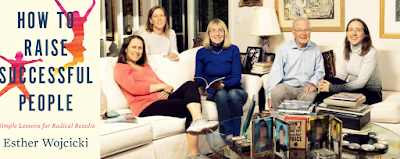 The evidence is overwhelming that in our schools today, the successful curriculums are those that are directed toward deeper learning, project-based learning, and social and emotional learning.
The evidence is overwhelming that in our schools today, the successful curriculums are those that are directed toward deeper learning, project-based learning, and social and emotional learning.
Learners that feel empowered and hands-on, that collaborate and learn empathy are the ones who excel academically.
So why shouldn't the same be true of parenting? The recent cheating scandal certainly shows the other extreme. What happens amidst helicopter parenting run amuck, of parents not having faith in the innate abilities and independence of their kids.
Maybe you don’t have to let your 11 or 12-year-old fly off to France and change planes by themselves as my guest did, but giving them responsibly at home from a young age is essential.
Few people understand this better than Esther Wojcicki. Esther understands not in some abstract white paper kind of way, but by having raised three incredibly successful daughters; Ann, the co-founder of 23 and me, Susan is the CEO of YouTube and Janet is a distinguished doctor and professor of pediatrics.
Esther is in her own right an amazing success story. A formidable voice on behalf of journalism and media literacy, Esther Wojcicki is the founder of the Media Arts programs at Palo Alto High School and serves as vice chair of Creative Commons and was instrumental in the launch of the Google Teacher Academy. Her new book is How to Raise Successful People: Simple Lessons for Radical Results.
My conversation with Esther Wojcicki:
Thursday May 23, 2019
We Are Not Descended From Fearful Men: David Maraniss and "A Good American Family"
Thursday May 23, 2019
Thursday May 23, 2019

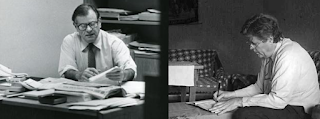 Mark Twain is reported to have said that history does not really repeat itself, but it often rhymes. Today we live in a climate, not unlike the late ’40s and early ’50s, where fear is weaponized, and where suspicion of the other is exploited as a salve for change.
Mark Twain is reported to have said that history does not really repeat itself, but it often rhymes. Today we live in a climate, not unlike the late ’40s and early ’50s, where fear is weaponized, and where suspicion of the other is exploited as a salve for change.
Yet there always seem to be brave men and women trying to rise above. As Ed Murrow said in his takedown of Senator Joe McCarthy,” we were not descended from fearful men. They were not men who feared to write or to speak,” who, again in Murrow’s words, “did not confuse dissent with disloyalty.”
But fear is personal, visceral, and chilling when exploited by the government. It undermines the very foundation of a democratic republic, and sometimes of families. Two-time Pulitzer Prize winner David Maraniss makes it as personal as it can be in A Good American Family: The Red Scare and My Father. The story of his father and his family caught in the maelstrom of the red scare in the 1950s.
My conversation with David Maraniss:
Tuesday May 21, 2019
Tuesday May 21, 2019
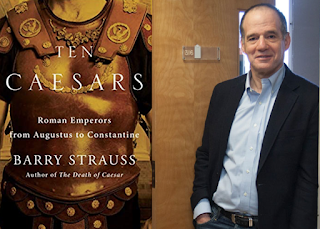 Today as we sometimes contemplate the real possibility of the end of the American experience. We think about its roughly 250-year history, often in the context of the people that have led us, good and bad, and taken us to where we are today.
Today as we sometimes contemplate the real possibility of the end of the American experience. We think about its roughly 250-year history, often in the context of the people that have led us, good and bad, and taken us to where we are today.
So perhaps it might be instructive to look at the 500 years history of the Roman Empire, and look at some of its leaders. Some who drove it to great heights and others who were responsible for taking it over the proverbial cliff.
Barry Strauss, professor of history and classics at Cornell, is a leading expert on ancient military and Roman history. His latest work, Ten Caesars: Roman Emperors from Augustus to Constantine, and our recent conversation gives us new insights to where we might be headed.
My conversation with Barry Strauss:
Friday May 17, 2019
Fear, Loathing and Immigration: The Battle Was Once Much Worse
Friday May 17, 2019
Friday May 17, 2019
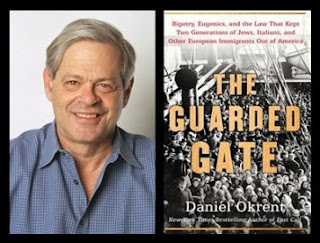 Immigration and the fear of outsiders is a deep strain in the American psyche. It didn’t start with Donald Trump. In fact, it hasn’t even reached its full flowering under this administration. When Trump talked of murderers and rapists coming to the border, of other nations not sending us their best, he was merely echoing a historical context that has actually played out in far worse ways in our history
Immigration and the fear of outsiders is a deep strain in the American psyche. It didn’t start with Donald Trump. In fact, it hasn’t even reached its full flowering under this administration. When Trump talked of murderers and rapists coming to the border, of other nations not sending us their best, he was merely echoing a historical context that has actually played out in far worse ways in our history
From the Chinese Exclusion Act through the highly restrictive immigration acts passed in the early 20th century, the white Christians have always felt under siege. To make matters even worse, in the early part of the 20th century the rhetoric and false science of eugenics was weaponized in the immigration battles.
This is the story that my guest Daniel Okrent tell in The Guarded Gate: Bigotry, Eugenics and the Law That Kept Two Generations of Jews, Italians, and Other European Immigrants Out of America:
My conversation with Daniel Okrent:
Wednesday May 08, 2019
Democracies Are Not Forever...Is The US Headed Down The Same Path As Rome?
Wednesday May 08, 2019
Wednesday May 08, 2019
 Every day, no matter what the issue — whether it’s election integrity, rule of law, climate change, guns, impeachment, or the Mueller report — what’s at stake is not just daily political wins and losses, but the very survival of the republic.
Every day, no matter what the issue — whether it’s election integrity, rule of law, climate change, guns, impeachment, or the Mueller report — what’s at stake is not just daily political wins and losses, but the very survival of the republic.
As was the case at its founding, during the Civil War, and at a select few times in US history, Americans would be making a huge mistake if they took the survival of the nation for granted. History tells us that the Roman Republic had a very good 400-year run, only to have its citizens let it fail.
In this podcast we talk to prize-winning historian, professor, and Rome scholar Edward Watts. He takes us through some of the frightening parallels, which include cults of personality, dramatic wealth creation, the wearing down of critical guardrails and norms, and the willingness of Roman voters to ignore the damage being done as Rome exchanged freedom for autocracy.
Watts explains how, while it may have taken 100 years for the full effects to be felt, violent language, immigration issues, the ginning up of fear, and the violation of conventions in order to implement policy all played important roles. It’s ancient history we should well remember.
Monday May 06, 2019
Outright Lies Are Posing As Today's Conspiracy Theories
Monday May 06, 2019
Monday May 06, 2019
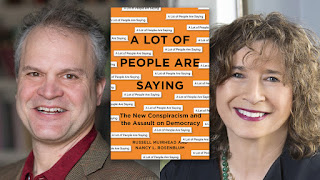 Long before the Internet, in the early days of talk radio, the all-night hosts were the progenitors of modern-day conspiracy theory. Hosts spent hours talking about crop circles, animal mutilation, Area 51, the Kennedy assassination and all manner of events and evidence that could be used to construct a hidden narrative.
Long before the Internet, in the early days of talk radio, the all-night hosts were the progenitors of modern-day conspiracy theory. Hosts spent hours talking about crop circles, animal mutilation, Area 51, the Kennedy assassination and all manner of events and evidence that could be used to construct a hidden narrative.
The idea was that strange things were happening, that evidence in plain sight could be interpreted in ways that evolved to different conclusions. The narrative was always about the interpretation of evidence that was in plain sight. We were told that we just didn’t understand the full impact of what it meant.
Today, all of that has changed. Almost like science, the “conspiracy theories” today from people like Alex Jones, or Donald Trump are not about another way of interpreting the world. It’s all about flat out lies, fabricated rumors and it’s often presented with the only backup being the mantra, “people are saying.”
Laying bear this new look to conspiracies are Harvard Professor Nancy Rosenblum and Dartmouth Professor Russell Muirhead in their book A Lot of People Are Saying: The New Conspiracism and the Assault on Democracy
My conversation with Nancy Rosenblum and Russell Muirhead:
Thursday May 02, 2019
The Klan and White Supremacy...Then and Now
Thursday May 02, 2019
Thursday May 02, 2019
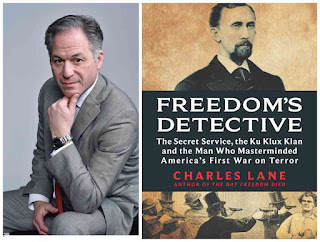 Even though it may not seem like it, domestic terrorism, particularly built around white supremacy, is nothing new. Given that racism is our nation's original sin, it should not be surprising that in the post Civil War period, the historical efforts to deal with the Ku Klux Klan are both instructive in their own right, but at the same time foreshadows the thru lines that lead us to where we are today.
Even though it may not seem like it, domestic terrorism, particularly built around white supremacy, is nothing new. Given that racism is our nation's original sin, it should not be surprising that in the post Civil War period, the historical efforts to deal with the Ku Klux Klan are both instructive in their own right, but at the same time foreshadows the thru lines that lead us to where we are today.
This is the story that the Washington Post’s Charles Lane shares in his book Freedom's Detective: The Secret Service, the Ku Klux Klan and the Man Who Masterminded America’s First War on Terror.
My conversation with Charles Lane:
Wednesday May 01, 2019
We'll Be OK If We Can Make It to 2040
Wednesday May 01, 2019
Wednesday May 01, 2019
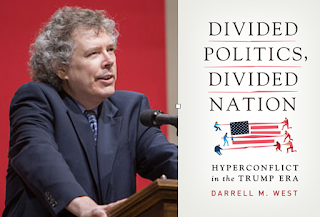 America has often been a divided nation. Battles at our founding were often settled at 50 paces.The western ethos that is part of half of America fueled many of those divisions. Brother fought against brother
America has often been a divided nation. Battles at our founding were often settled at 50 paces.The western ethos that is part of half of America fueled many of those divisions. Brother fought against brother
in the civil war. The industrial revolution gave us riots, and death and violence. The cold war and fear of communism gave rise to whole careers and lives ruined just by accusation. The ’60s didn’t just produce great music but led to the death of students on the safety of a college campus.
But, to use the often tired cliche of Wall Street, this time it’s different. Or at least so it seems. The divide today, fueled by social media, by 24/7 news cycles and the decline of faith in our basic institutions and fear of hyper-rapid and deep fundamental change has produced a kind of tribalism that undermines rather than reinforces all the central ideas of democracy and republican government.
Darrell M. West vice president and director of governance studies at the Brookings Institution looks at all of this in Divided Politics, Divided Nation: Hyperconflict in the Trump Era.
My conversation with Darrell West:
Monday Apr 29, 2019
If Democracy Requires Critical Thinking, Are We Doomed?
Monday Apr 29, 2019
Monday Apr 29, 2019
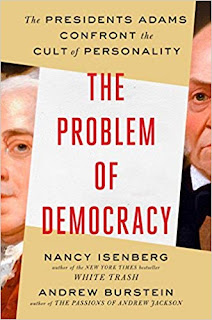 Ukraine just elected a comedian as its president. A reality TV character holds the most powerful office on the planet. Talk show hosts are driving the agenda of US policy and not a day goes by that we don’t hear talk about more celebrities running for office
Ukraine just elected a comedian as its president. A reality TV character holds the most powerful office on the planet. Talk show hosts are driving the agenda of US policy and not a day goes by that we don’t hear talk about more celebrities running for office
The membrane that separates news, governance, and entertainment has all but disappeared and efforts to raise any conversation above the noise drives our celebrity culture.
The debate about this goes to the core of our democratic system. The question of whether we will have to change our system or our change our culture is a legitimate open question. It’s also one that our framers viewed 140 years ago.
Nancy Isenberg and Andrew Burstein talk to me The Problem of Democracy: The Presidents Adams Confront the Cult of Personality.
about it and about their book
My conversation with Nancy Isenberg and Andrew Burstein:
Monday Apr 22, 2019
Monday Apr 22, 2019
 Sometimes the personal is professional. It’s not all that common when ones work and one's survival is linked so inexorably together. They are in the story Tom Patterson and Steffanie Strathdee.
Sometimes the personal is professional. It’s not all that common when ones work and one's survival is linked so inexorably together. They are in the story Tom Patterson and Steffanie Strathdee.
Imagine, you're climbing a mountain, you slip and your spouse is the clinging to the rope above you and that’s the only thing keeping you alive. In the story of Tom and Steffanie, it was Steffanie clinging to science, history and medical bravery that Tom would have to hang on to.
They tell their remarkable story in The Perfect Predator: A Scientist's Race to Save Her Husband from a Deadly Superbug: A Memoir
My conversation with Tom Patterson & Steffanie Strathdee:
Wednesday Apr 17, 2019
The Remembered Past vs. The Real Past
Wednesday Apr 17, 2019
Wednesday Apr 17, 2019
 Old songs, like old memories, are the purveyors of a kind of double imagery. Triggers of thought that somehow short circuit time and make yesterday's events today's reality. So when we write or read about the past, particularly in novels or memoirs, what we are reading, or writing, is not necessarily factual, but represents our remembered past..almost a separate world unto itself.
Old songs, like old memories, are the purveyors of a kind of double imagery. Triggers of thought that somehow short circuit time and make yesterday's events today's reality. So when we write or read about the past, particularly in novels or memoirs, what we are reading, or writing, is not necessarily factual, but represents our remembered past..almost a separate world unto itself.
Award winning novelist Siri Hustvedt looks at this in her latest novel, Memories of the Future
My conversation with Siri Hustvedt:
Wednesday Apr 10, 2019
Why Coders Matter and Why They Control Our Future
Wednesday Apr 10, 2019
Wednesday Apr 10, 2019
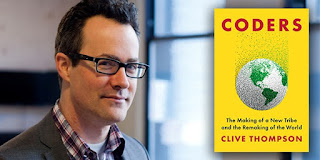 Think of the millions of hours we spend thinking and talking about technology. About the future, what it all means, and how it impacts us. But before any this happens, before robots or AI, or even making a phone call, someone had to sit down at a screen and create the code to make it possible.
Think of the millions of hours we spend thinking and talking about technology. About the future, what it all means, and how it impacts us. But before any this happens, before robots or AI, or even making a phone call, someone had to sit down at a screen and create the code to make it possible.
A process that is not just about abstraction, but about both art and craft. Like Chomsky said of language itself, “it etches a groove through which thought flows.” It’s been said that when we study human language, we are approaching what some call the human essence. When we study code and those who create it, arguably we are getting to the singularity of man and machine. This is the state that NY Times journalist Clive Thompson takes us to in Coders: The Making of a New Tribe and the Remaking of the World.
My conversation with Clive Thompson:
Saturday Mar 30, 2019
Saturday Mar 30, 2019
 Several years ago, the tech company Cisco ran an ad campaign talking about the “human network.” It tried to humanize their networking products as more than just wires and routers but focused on the human beings at the other end of those wires, and the collective experience of connection.
Several years ago, the tech company Cisco ran an ad campaign talking about the “human network.” It tried to humanize their networking products as more than just wires and routers but focused on the human beings at the other end of those wires, and the collective experience of connection.
Social connections that have been with us since man first stepped out of the cave and talked to his neighbor. All of that was before today’s social networks that have been like steroids to the idea of connection.
Today we are part of a networking feedback loop. Who we connect with impacts who we become and who we become impacts who we connect with. If all of this sound is a bit abstract, Matthew Jackson puts it all into perspective in The Human Network: How Your Social Position Determines Your Power, Beliefs, and Behaviors.
My conversation with Matthew Jackson
Saturday Mar 30, 2019
The Brave New World of Immunotherapy
Saturday Mar 30, 2019
Saturday Mar 30, 2019
 It’s hard to believe today, but leaching was once considered a legitimate and effective medical practice. Years from now, we may look back upon chemotherapy and radiation treatment for cancer in much the same way we now look upon leaching.
It’s hard to believe today, but leaching was once considered a legitimate and effective medical practice. Years from now, we may look back upon chemotherapy and radiation treatment for cancer in much the same way we now look upon leaching.
In labs today, all across the world, new forms of treatment for cancer and many other diseases under the general heading of immunotherapy are being discovered. The magic of the body’s own immune system is being brought to the task. However, there is no one size fits all, no silver bullet and such treatments are not a free ride. Either with respect to costs or side effects.
Just as the discovery of penicillin and the class of antibiotics, saved millions and truly changed the world, immunotherapy is on the precipice of doing the same for the 21st century.
However, its complexity, its connection to virtually every other aspect of the human body makes its study and the ability to harness and manipulate it, the medical holy grail of our times. Helping us to understand this is Pulitzer Prize winning journalist Matt Richtel in Elegant Defense, An: The Extraordinary New Science of the Immune System: A Tale in Four Lives.
My conversation with Matt Richtel:
Thursday Mar 28, 2019
Should We Negotiate With Hostage Takers?
Thursday Mar 28, 2019
Thursday Mar 28, 2019
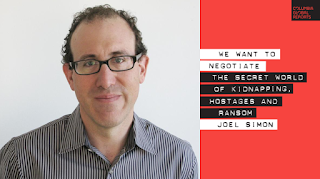 In a world that is increasingly more authoritarian, in a political atmosphere that is more and more polarized and tribal everywhere, the threat of global hostage-taking has increased exponentially.
In a world that is increasingly more authoritarian, in a political atmosphere that is more and more polarized and tribal everywhere, the threat of global hostage-taking has increased exponentially.
As the murder of Jamal Khashoggi illustrates, this threat has particularly increased for journalists, many of whom are on the front lines of reporting on repression and brutality. A record 262 journalists were jailed around the world at the end of 2018.
All of this raises the far larger question, one that journalists have to think about every day, of how should we deal, as a matter of public policy, with journalists or anyone other citizen that is taken, hostage.
The American policy has been that "we do not negotiate with hostage takers." This policy is not universal. Many nations, including France, Spain, and others have taken a different view. The answer is not clear cut or obvious. What is clear is that sometimes playing mister tough guy is just plains stupid.
Joel Simon, a long time journalists in California and Latin America, is the Executive Director of the Committee to Protect Journalist. His new work is We Want to Negotiate: The Secret World of Kidnapping, Hostages and Ransom.
My conversation with Joel Simon:

